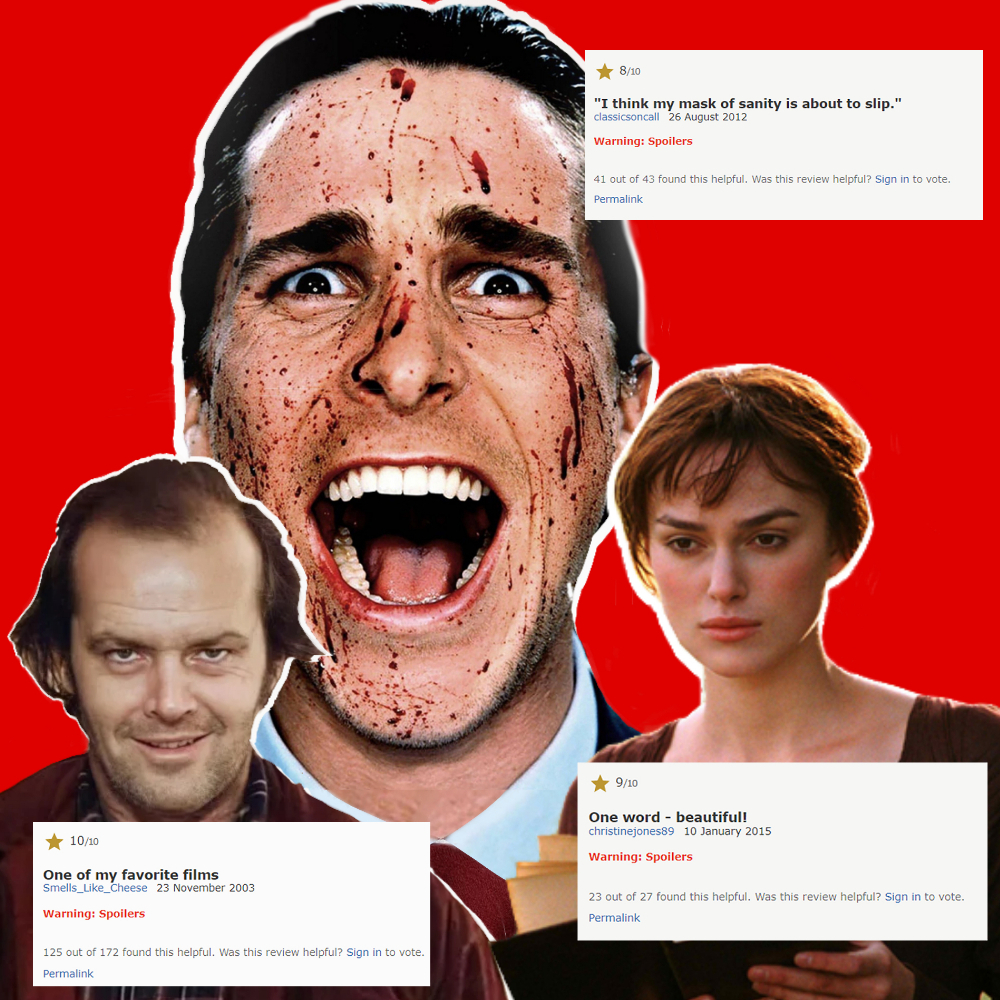Please visit response.fsu.edu for official FSU updates and resources.
Book or Movie? Who did it better?

Remakes, live actions, and book adaptations seem to be the only current renditions of originality circulating within the film industry. Arguably, book adaptations are the most regurgitated platform of resources, making it less respectable to book lovers like I. Whether the film should adhere to the needs of book fanatics seeking verbatims or enter a new realm of novel-based ideas seems to be the question at hand. Childhood films like the Harry Potter series and The Chronicles of Narnia franchise hold influential stances on bibliophiles and the alike, which tend to cloud the current perception of book adaptations. Mind my saying, but they merely prance around the denotation without much-needed refinement. Some films that attempt both ends of audience demands but miss the mark by a single hair are American Psycho, Pride and Prejudice (the Keira Knightly version, obviously), and The Shining.
Foremost, the novel American Psycho was originally and continues to be such a controversial read. The novel is evidently and heavily satirical, but certain individuals lack the proper cognizance and humor required to indulge in author Bret Easton Ellis’ portrayal of masked sanity. Upon the novel’s release in 1990, bookstores, more specifically their female employees, flocked from their high grounds to protest the publication and distribution of American Psycho on its basis of inciting violence, misogyny, etc. Without even reading the book! As a woman and fellow bookworm, I cast shame on those who literally judged a book by its cover! The controversy only inflated the film’s arrival. The movie is rather tame compared to Ellis’ grisly lexicon, which is saying a lot, considering the nature of the genre the film resides in.
The director of American Psycho, Mary Harron, translated the novel in the most respectable but visually impressive way. Each dialogue and action can be traced back to a chapter from the book while allowing the film to be digestible for spectators. From when I first dove into analyzing the inner workings of Patrick Bateman, I was haunted by Ellis’ heinous addition of animal cruelty. Harron used the same scene I am referring to, Bateman’s encounter with the homeless man, but skillfully lessened the degree to which it occurred. She also took it upon herself to exclude cannibalism, vicious homophobia, child-related macabre, and many other aspects deemed conceptually unfit for most viewers. While I commend Harron for such, she herself admits to miscalculating the finale monologue. The film concludes with the audience debating whether the murders only occupied Bateman’s mind, but the novel makes this a clear-cut distinction. For this reason, I am partial to Ellis’ rendition of American Psycho. The constant gasps and staggering reactions I endured were a literary experience I have yet to repeat. I hate to say it, but the book did it better.
Keira Knightly’s renowned Pride and Prejudice (2005) touched the hearts of many, but especially Jane Austen (author) connoisseurs. After habitually having the Austen fandom shove their wannabe feministic ideals into my face, I can never endure her literary pieces the same. Idealizing conformity is simply not my cup of tea. But for a silly little romance film: I have no complaints. Keira Knightly and Matthew Macfayden delivered a heart-pounding performance. Albeit, the real credit lies with the filmmakers. Spewing the undecipherable Old English from off the pages and into the minds of the easily impressionable romantics, who craze nothing more than to have their love interest “bewitched…body and soul” was a smart, profitable tactic on their behalf. It should be noted that Keira Knightly’s Pride and Prejudice was not the first film adapted from the novel, nor the last, but it is arguably the most beautifully executed.
Unlike the films mentioned above, where I read the novel before succumbing to its visualized replica, I saw The Shining without a source to compare it to. An unbiased review conjured from the midsts. Hence, thereafter purchasing my first Stephen King, I eagerly bounced from word to word that is until a hundred-plus pages in. I erupted in frustration as the Torrance family had yet to enter the Outlook Hotel. I ultimately never completed the novel, as a result. The pacing was evidently and appreciatively accelerated for the film. Another notable aspect filmmakers artistically rendered was Jack Torrance's extensive backstory which might have lessened the ambiguity of his character development but at the risk of blemishing the overall plot. According to Stephen King specialist and dear friend, Lily Wagner, the novel extorts the paranormal with psychological accents as most Stephen King novels do, but the film under Stanley Kubrick’s command alludes to Jack Torrance’s downfall due to cabin fever. Kubrick exaggerated most scenes to fit his deranged reputation.
The scene with the elevator, whose crevices tease the vast amounts of blood patiently awaiting its victims, did not derive from the book, nor the hedge maze or the infamous twin girls for that fact. The novel instead held an elevator full of paranoia. For these reasons, as well as others, King did not like the movie. A mini-series of the same name was made in 1997 to appeal to King’s initial vision. Stephen King cameos in the miniseries, as he does in all of his adaptations with the obvious exception of Kubrick’s The Shining. Thus the novel and film have become two separate entities that should not be hindered by comparability, but rather praised for their unique interpretations of horror. Making it neither better as a book nor a film, but a standalone masterpiece.
Films with the same title as their novel predecessor have high risk and reward factoring. American Psycho, Pride and Prejudice, and The Shining gained the reputation and fanbase associated but heightened the likelihood of disappointment from their respective die-hard enthusiasts. The chasms between films and their source materials may seem trivial, but it is the fine details that grant them superior or allow them to fall short. Unfortunately, American Psycho wallows in the latter, Pride and Prejudice asserts its dominance, while The Shining plunges too deep from its genesis that it occupies not on the scale. For film aficionados seeking more intense content to occupy their hebdomadal colloquy of the subject, I heavily recommend reading the novel it was based upon.
Writer: Yenesis Sotomayor
Artist: Hannah Liu



